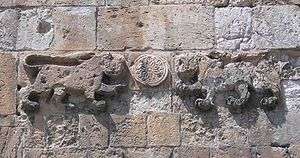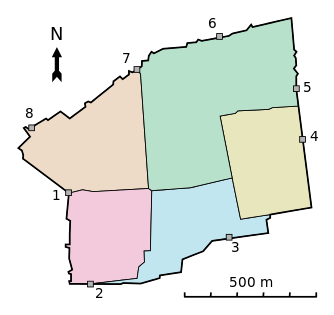Lions' Gate
| Lions' Gate | |
|---|---|
|
Lions' Gate | |
 Location in Old Jerusalem | |
| General information | |
| Town or city | Jerusalem |
| Coordinates | 31°46′51″N 35°14′13″E / 31.78083°N 35.23694°ECoordinates: 31°46′51″N 35°14′13″E / 31.78083°N 35.23694°E |
The Lions' Gate (Hebrew: שער האריות Sha'ar ha-Arayot, Arabic: باب الأسباط, also St. Stephen's Gate or Sheep Gate) is located in the Old City Walls of Jerusalem, Israel and is one of seven open Gates in Jerusalem's Old City Walls.
Located in the Eastern Wall, the entrance marks the beginning of the traditional Christian observance of the last walk of Jesus from prison to crucifixion, the Via Dolorosa. Near the gate’s crest are four figures of leopards, often mistaken for lions, two on the left and two on the right. They were placed there by Sultan Suleiman the Magnificent to celebrate the Ottoman defeat of the Mamluks in 1517. Legend has it that Suleiman's predecessor Selim I dreamed of lions that were going to eat him because of his plans to level the city. He was spared only after promising to protect the city by building a wall around it. This led to the lion becoming the heraldic symbol of Jerusalem.[2] However, Jerusalem already had been, from Biblical times, the capital of the Kingdom of Judah, whose emblem was a lion (Genesis 49:9).[3]
In another version, Suleiman taxed Jerusalem's residents with heavy taxes which they could not afford to pay. That night Suleiman had a dream of two lions coming to devour him. When he woke up, he asked his dream solvers what his dream meant. A wise respected man came forward and asked Suleiman what was on his mind before drifting to sleep. Suleiman responded that he was thinking about how to punish all the men who didn't pay his taxes. The wise man responded that since Suleiman thought badly about the holy city, God was angry. To atone, Suleiman built the Lions' Gate to protect Jerusalem from invaders.
Israeli paratroops from the 55th Paratroop Brigade came through this gate during the Six-Day War of 1967 and unfurled the Israeli flag above the Temple Mount.
Historian Moshe Sharon notes the similarity of the sculpted lions to similar pairs at Jisr Jindas and Qasr al-Basha in Gaza. All represent the same Sultan: Baybars. Sharon estimates that they all date to approximately 1273 C.E.[4]
| Baibar's lions | ||||
|---|---|---|---|---|
|
The gate is part of the city's extant walls, built by Ottoman Sultan Suleiman in 1542. The walls stretch for approximately 4.5 kilometers (2.8 mi) and rise to a height of 5–15 meters (16–49 ft), with a thickness of 3 meters (9.8 feet).[5] All together, the Old City walls contain 43 surveillance towers and 11 gates, seven of which are presently open.
References
- ↑ Jerusalem municipality website
- ↑ Jerome Murphy-O'Connor, The Holy Land: an Oxford archaeological guide from earliest times to 1700, 2008, p. 21, ISBN 978-0-19-923666-4
- ↑
- ↑ Sharon, 2009, p. 58 and pl.6.
- ↑ The Jerusalem Post Millennium Special Archived 2007-04-29 at the Wayback Machine.
External links
| Wikimedia Commons has media related to Lions Gate. |

